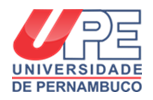Motivated by the evaluations of the Program by CAPES, in addition to new guidelines from the Graduate Chamber of the University of Pernambuco, the PPGEC Collegiate initiated in 2013 a revision of its internal regulations and its curricular structure. Subsequently, in 2017, a new revision was made, this time to incorporate the necessary adjustments for the new PhD course approved in 2018 by CAPES. This revision came into force, therefore, in 2018 and is in force until the present moment. The Rules of Procedure are public and available on the PPGEC website.
Since then, the PPGEC Collegiate established "Computer Science" as a unique concentration area of the Program – also following the trend of the other National Graduate Computer Programs – to meet the guiding principles of the new PhD course considering the evolution of the teaching staff of PPGEC and the current demands of Stricto Sensu Graduation in Computer Engineering in the context in which PPGEC is inserted. In addition, the Collegiate has revised the lines of research to adequately represent the evolution of the program, and now it is as follows: The line of Intelligent Computing became Computational Intelligence and the line of Software Engineering has given way to the Modeling and Computational Systems line. For both courses (master's or doctorate), the PPGEC's disciplines are divided into three categories: basic subjects, general electives and elective subjects per research line. The basic disciplines are related to the central aspects of a computer course, but at a graduate level. This category includes the following subjects:
- Analysis of algorithms
- Computer Architecture
- Database
- Didactics of higher education
- Scientific methodology
- Paradigms of programming languages
- Probability and stochastic processes
- Computer network
- Operational systems
- Theory of Computation
The general electives focus on advanced studies on topics that can be used by students from the two PPGEC research lines. These disciplines are as follows:
- Software development environments
- Analysis of programs
- Analysis of social networks
- Evolutionary computing
- Parallel computing
- System specification and verification
- Swarm Intelligence
- Data Mining
- Modeling and simulation
- Computational Neuroscience
- Multi-objective optimization
- Digital image processing
- Digital voice processing
- Design of programming languages
- Artificial neural networks
- Semantics of programming languages
- Complementary Seminar
- Embedded systems
- Multi-agent systems
- Theory of information
- Advanced Topics in Smart Computing
- Advanced Topics in Software Engineering
- Advanced topics in pattern recognition
- Computer vision
Lastly, the disciplines of the elective category per research line aim to deepen specific aspects of the areas of action of this Graduate Program. The lines are:
- Research Line: Modeling and Computational Systems
- Software Engineering
- Experimental Software Engineering
- Applications in Software Engineering
- Requirements Engineering
- Research Line: Computational Intelligence
- Smart Computing
- Applications in Intelligent Computing
- Pattern Recognition
The student is expected to complete a workload of at least 450 hours of classes. In this program, the payment of class hours is expressed in units of credit: each unit corresponds to 15 hours. In general, each discipline corresponds to 4 credits (60 hours), except for the subjects of Higher Education Didactics and Scientific Methodology (2 credits each).
The other exception in terms of amount of credits is the discipline of Complementation Seminar, which has 3 credits (45 hours). This course encompasses the student's involvement in technical activities outside the course, such as attending conferences, attending master's and doctoral degrees in his area of research, participating in mini-courses, and other activities. These activities are recognized by official declaration or certificate of participation that proves the student's involvement in said activity.
The 30 units of credit (450 hours of class) should be obtained as follows: 8 credits in 2 basic subjects, 8 credits in 2 general electives, 8 credits in 2 courses of the research line, 3 credits in Seminary of complementation, and 3 credits for the defense of his dissertation. In particular, the defense of the dissertation cannot be carried out before obtaining 27 credits. Additionally, the Program requires the student to carry out teaching internship, regardless of whether the student has a scholarship or not.
Of the 30 credit units, it is expected that 27 will be obtained in the first year of the course, as well as the completion of the teaching internship. In this way, in the second year, the student with more maturity from the disciplines studied will dedicate entirely to research activities.
As you can see from the previous list of disciplines, there is a significantly greater supply of disciplines than the number of disciplines the student needs to attend. In this way, the choice of the subjects is carried out jointly by the student and his / her tutor, considering the scope of the research.
The Internal Rules of the Program, updated in 2014, also introduced important devices to promote publications with students. One of the changes indicates that the student of the PPGEC can only submit to the "Defense of Dissertation" after having approved a scientific article in conference or periodical with peer review or is awaiting a process of revision of the same. Another device introduced in the Regiment of 2014 makes it possible to compute credits equivalent to an elective course subject to the student who develops one or more of the following activities:
- full paper published in a conference or journal with Qualis B1 or higher, of which he is the first author and has a proven relationship with the dissertation project of the student;
- chapter of a book of recognized merit in the area of knowledge and that has a proven relationship with the dissertation project of the student.
Therefore, as can be seen, the PPGEC has a flexible and broad curricular structure, which allows each student, together with his or her supervisor, to develop a study plan that is adequate to the objectives of each research, as well as stimulating the publication of articles by part of the students. The following are highlights of this curricular structure:
- The concern to train students not only technically capable, but also competent in the dissemination of content: objective of the discipline of Higher Education Didactics and compulsory teaching internship;
- Encouraging the participation of complementary activities, expanding the actions of the student beyond the borders of the PPGEC: objective of the discipline of Seminar of Complementation;
- The study and discussion of current computer problems and with great impact on society.
For more information, read the Internal Rules of PPGEC available in the Downloads area.


